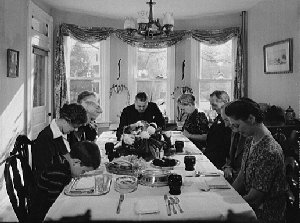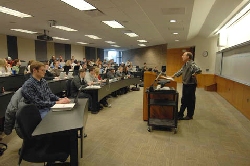- What kind of grace do you give at turkey time?
 One of the reasons I enjoy Thanksgiving is because it is one of the few holidays where we do not have to exchange gifts. We simply get together with family and friends and enjoy the company. Maybe we'll watch a parade on television or perhaps some football, but it's the communal experience which I enjoy the most. For some reason, the preparation of the meal is less of a chore and more of a pleasure, probably because we realize it is designed for many people on a special day.
One of the reasons I enjoy Thanksgiving is because it is one of the few holidays where we do not have to exchange gifts. We simply get together with family and friends and enjoy the company. Maybe we'll watch a parade on television or perhaps some football, but it's the communal experience which I enjoy the most. For some reason, the preparation of the meal is less of a chore and more of a pleasure, probably because we realize it is designed for many people on a special day.
We're all familiar with the origins of Thanksgiving, that the Pilgrims at Plymouth were thankful to celebrate the harvest at the end of the season. Actually, Thanksgiving traces its roots back to the 1500's in England. It's an old custom, and a good one as we would be remiss if we didn't periodically take time to be thankful for the blessings we have received, be they few or many.
As a child, I was thankful simply to have the clan assemble, which was a rarity as the family was spread out across the country. We would have the meal at my grandmother's house in Buffalo, New York, and I can distinctly remember the aromatic smells emanating from the kitchen which seemed heavenly. I would get the opportunity to talk with my grandparents, great-grandparents, and aunts and uncles. Everyone was in good spirits and helped as required. Occasionally, a squabble would erupt between family members over some innocuous subject which was quickly quelled and forgotten. If my great-grandfather was in high spirits, he would bring out his fiddle and play a tune from a distant era, much to everyone's approval. It was interesting to watch the family dynamics, even at an early age. From time to time, I would sneak into the kitchen to check on progress and steal a nibble of something before getting caught. The room was awash in activity; relish trays being garnished with radishes, green onions, celery, and olives; salads being prepared along with appetizer trays consisting of a variety of dips and delicacies; in addition to the turkey and stuffing, there were mashed potatoes, sweet potatoes, pearl onions, beets, cranberries, crescent rolls, and at least three different pies for dessert. As a kid, the room was a magical tapestry of smells and delights. It still seems this way to me many years later.
As I got older and moved up the family hierarchy, I learned to assume more responsibility in the preparation of the meal, such as dressing the bird and carving the meat. When we were finally called to the table, we all knew this was a special meal for a special occasion. To me, the Thanksgiving dinner is not complete without grace. As a child, it was always considered an honor to be selected to say the grace before the meal, which should be done with tact and presentation. A lot of kids tend to avoid the limelight of saying grace, but we considered it an essential part of the meal, hence an honor to deliver it on such an auspicious occasion.
As an adult, when I am asked to give the grace, I try to convey the fundamental things that truly affect us, such as:
* That we are thankful of all of the blessings we have, large or small; that we have a roof over our head in these perilous economic times; that we are in good health and remember those who are not.
* That we are thankful to live in a great country, even though we are cognizant it is certainly not perfect. We are thankful for the freedoms we enjoy as defined by the U.S. Constitution.
* That we are thankful for the people who protect and defend our nation; we pray they be protected from harms way.
* That we are thankful that we are all together for this bountiful meal, and to remember those who preceded us as well as those yet to come.
I think the Thanksgiving Prayer written by Samuel F. Pugh covers several of my concerns:
O God, when I have food,
help me to remember the hungry;
When I have work,
help me to remember the jobless;
When I have a home,
help me to remember those who have no home at all;
When I am without pain,
help me to remember those who suffer,
And remembering,
help me to destroy my complacency;
bestir my compassion,
and be concerned enough to help;
By word and deed,
those who cry out for what we take for granted.
Amen.
help me to remember the hungry;
When I have work,
help me to remember the jobless;
When I have a home,
help me to remember those who have no home at all;
When I am without pain,
help me to remember those who suffer,
And remembering,
help me to destroy my complacency;
bestir my compassion,
and be concerned enough to help;
By word and deed,
those who cry out for what we take for granted.
Amen.
Then again, as a Scotsman, I may turn to "The Selkirk Grace":
Some hae meat and canna eat,
And some wad eat that want it;
But we hae meat, and we can eat,
And sae let the Lord be thankit.
And some wad eat that want it;
But we hae meat, and we can eat,
And sae let the Lord be thankit.
Just don't expect me to pipe in a turkey stuffed with haggis.
Happy Thanksgiving everyone!
Originally published: November 20, 2012
Keep the Faith!
Note: All trademarks both marked and unmarked belong to their respective companies.
 Tim Bryce is a writer and the Managing Director of M&JB Investment Company (M&JB) of Palm Harbor, Florida and has over 30 years of experience in the management consulting field. He can be reached at timb001@phmainstreet.com
Tim Bryce is a writer and the Managing Director of M&JB Investment Company (M&JB) of Palm Harbor, Florida and has over 30 years of experience in the management consulting field. He can be reached at timb001@phmainstreet.com
For Tim's columns, see:
timbryce.com
Like the article? TELL A FRIEND.
Copyright © 2014 by Tim Bryce. All rights reserved.
NEXT UP: THE FACTS OF LIFE REGARDING MANAGEMENT - One of four new books from Tim; this book provides lessons well suited for those aspiring to become effective managers.
LAST TIME: DOG POOP - What do your dogs think about all of this?
Listen to Tim on WJTN-AM (News Talk 1240) "The Town Square" with host John Siggins (Mon, Wed, Fri, 12:30-3:00pm Eastern); WZIG-FM (104.1) in Palm Harbor,FL; The Glenn Pav Show on WTAN-AM (1340) in Clearwater, FL, Mon-Fri (9-10am); and KIT-AM 1280 in Yakima, Washington "The Morning News" with hosts Dave Ettl & Lance Tormey (weekdays. 6:00-9:00am Pacific). Or tune-in to Tim's channel on YouTube.
 It is not often I discuss something as banal as dog poop, but I recently witnessed an incident which caused me to think about it.
It is not often I discuss something as banal as dog poop, but I recently witnessed an incident which caused me to think about it.
 In my 30+ years in the systems industry, I have seen a lot of computer printers; everything from high speed line printers that print 132 characters per line to the early laser printers and plotters, to today's consumer dot-matrix printers. I even have some of the original print wheels from the first high speed printer for the UNIVAC I. They're over 50 years old and I'm sure they're worth something, but I digress.
In my 30+ years in the systems industry, I have seen a lot of computer printers; everything from high speed line printers that print 132 characters per line to the early laser printers and plotters, to today's consumer dot-matrix printers. I even have some of the original print wheels from the first high speed printer for the UNIVAC I. They're over 50 years old and I'm sure they're worth something, but I digress.

 You know you're getting older when advertisers on television no longer solicit your business. It is natural for ad agencies to target the younger generation; the youngsters may not have the money, but they sure know how to spend it. Today, the "Millennials," those in their twenties to early thirties, seems to be the target du jour. However, I question the validity of the commercials today. For example, today's television ads show young people driving luxury automobiles, eating at fine restaurants, traveling to exotic locations, purchasing sizable homes and furnishing them with expensive furniture and electronics. They also enjoy lavish parties and participate in extreme sports.
You know you're getting older when advertisers on television no longer solicit your business. It is natural for ad agencies to target the younger generation; the youngsters may not have the money, but they sure know how to spend it. Today, the "Millennials," those in their twenties to early thirties, seems to be the target du jour. However, I question the validity of the commercials today. For example, today's television ads show young people driving luxury automobiles, eating at fine restaurants, traveling to exotic locations, purchasing sizable homes and furnishing them with expensive furniture and electronics. They also enjoy lavish parties and participate in extreme sports.
 I've never been comfortable with the concept of "Man Hours," not that it's a gender issue, but rather it implies ignorance of how time is used in the work place and fumbles away some simple management concepts needed to run any business, namely accountability and commitment. Actually, I thought the "Man Hour" concept disappeared with the passing of the 20th century, but it appears to be making a comeback.
I've never been comfortable with the concept of "Man Hours," not that it's a gender issue, but rather it implies ignorance of how time is used in the work place and fumbles away some simple management concepts needed to run any business, namely accountability and commitment. Actually, I thought the "Man Hour" concept disappeared with the passing of the 20th century, but it appears to be making a comeback.
 When I was very young I was involved in a bicycle accident whereby I was run over by a friend's bike, leaving a painful welt across my stomach. I recovered quickly, but ever since then whenever I see someone injured, I am overcome with a strange sense of pain. For example, if I happen to watch a video on the Internet showing some bone-heads involved in accidents, such as with skate boards, bicycles, or jumping off buildings, I can feel their pain. Consequently, I avoid watching such things. I call it extreme empathy.
When I was very young I was involved in a bicycle accident whereby I was run over by a friend's bike, leaving a painful welt across my stomach. I recovered quickly, but ever since then whenever I see someone injured, I am overcome with a strange sense of pain. For example, if I happen to watch a video on the Internet showing some bone-heads involved in accidents, such as with skate boards, bicycles, or jumping off buildings, I can feel their pain. Consequently, I avoid watching such things. I call it extreme empathy.
 File this under, "More changes due to technology." A friend recently e-mailed me an article on how resumes should be updated to give the impression the person is up-to-date with today's technology. It contended HR Departments (Human Resources) look at resumes for certain punctuation rules to consider if the candidate is current. The article offered a handful of suggestions which I found rather amusing.
File this under, "More changes due to technology." A friend recently e-mailed me an article on how resumes should be updated to give the impression the person is up-to-date with today's technology. It contended HR Departments (Human Resources) look at resumes for certain punctuation rules to consider if the candidate is current. The article offered a handful of suggestions which I found rather amusing.
 "How are you?" is a greeting we've been using for a long time and has spawned several mutations, such as the famous, "How ya doin?" The response is usually something like, "Fine, thank you." Over the years though, we've changed our response to indicate elation, such as "Great!", "Fabulous!", "Super!", "Wonderful!", etc., or to denote depression, such as "Lousy," "Horrible," or "I could kill someone!"
"How are you?" is a greeting we've been using for a long time and has spawned several mutations, such as the famous, "How ya doin?" The response is usually something like, "Fine, thank you." Over the years though, we've changed our response to indicate elation, such as "Great!", "Fabulous!", "Super!", "Wonderful!", etc., or to denote depression, such as "Lousy," "Horrible," or "I could kill someone!"
 Over 40 years ago, I graduated from a small public high school in Cincinnati, Ohio. The school always had an excellent reputation for academics and athletics. Interestingly, it continues to be nationally ranked as one of the finest high schools in the nation. Lately, I've noticed our teachers are beginning to pass away, which I guess is to be expected. Some we loved, some we despised. Nevertheless, they all left some sort of indelible impression on us, and I really do not think teachers realize the profound effect they have on their students. Let me give you a couple examples; last month my class lost two teachers, Edwin Napier and Rex Parker.
Over 40 years ago, I graduated from a small public high school in Cincinnati, Ohio. The school always had an excellent reputation for academics and athletics. Interestingly, it continues to be nationally ranked as one of the finest high schools in the nation. Lately, I've noticed our teachers are beginning to pass away, which I guess is to be expected. Some we loved, some we despised. Nevertheless, they all left some sort of indelible impression on us, and I really do not think teachers realize the profound effect they have on their students. Let me give you a couple examples; last month my class lost two teachers, Edwin Napier and Rex Parker.
 Whenever I bring up the subject of micromanagement, it inevitably leads to a discussion regarding the three basic theories of management (X, Y, and Z). Most young people are unfamiliar with these theories and, as such, I want to provide a brief description of each so they can distinguish between them.
Whenever I bring up the subject of micromanagement, it inevitably leads to a discussion regarding the three basic theories of management (X, Y, and Z). Most young people are unfamiliar with these theories and, as such, I want to provide a brief description of each so they can distinguish between them.